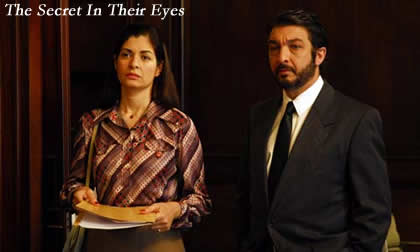 Academy awards has announced the five nominees for the Best Foreign Language Film Award.: “Ajami” Israel, “El Secreto de Sus Ojos” Argentina, “The Milk of Sorrow” Peru, “Un Prophète” France and “The White Ribbon” Germany will compete for this award.
Academy awards has announced the five nominees for the Best Foreign Language Film Award.: “Ajami” Israel, “El Secreto de Sus Ojos” Argentina, “The Milk of Sorrow” Peru, “Un Prophète” France and “The White Ribbon” Germany will compete for this award.
Argentina‘s entry, Juan Jose Campanella’s stylish genre-bending thriller “The Secret In Their Eyes” (El secreto de sus ojos) is a non-stop, witty, entertainment. Campanella (who shot episodes of Argentina’s “Law and Order”) adapted Eduardo Sacheri’s novel “La pregunta de sus ojos“, working with Sacheri. Director-editor Campanella blends romance, psychological back-stories, crime procedurals and comedy in a fluid complex suspensor.
Retired criminal-court employee Benjamin Esposito (Ricardo Darin) is writing a novel based on an unsolved murder-rape. He tells Judge Irene Hastings (Soledad Villamil), who is wary of lending her support. Morales (Pablo Rago), husband of the murdered woman, spent years haunting the train stations watching for the murderer. Two immigrant workers were railroaded for the murder, as flashbacks to the 70’s show. The flashbacks stir the political subtext and explain Irene’s initial reluctance to help Benjamin.
“Eye’s talk” claims Benjamin, decoding the small eye movements that betray peoples’ secret. It’s a useful quality for a novelist, an investigator and a lover. Irene and Benjamin have been attracted to each other since the 80’s when she joined the department. But Benjamin is out classed, pining for the Cornell-educated beauty married to a well -connected politico. Irene’s drawn in to helping him, as they 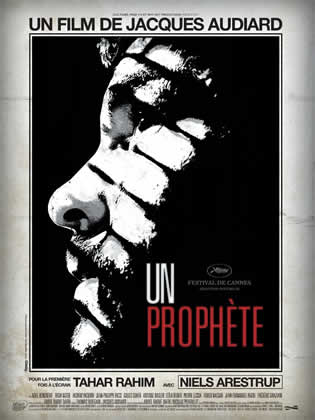 argue about the power of memory, the major topic of a country with a buried ugly past. Playing Benjamin over a twenty-year span, Darin allows the frustrations of years of working in a corrupt system leak out of every pore. Javier Godino plays the assassin working for the secret police’s death squad. Comic Guillermo Francella is memorable as Benjamin’s alcoholic buddy Pablo Sandoval. (On my 10 Best List)
argue about the power of memory, the major topic of a country with a buried ugly past. Playing Benjamin over a twenty-year span, Darin allows the frustrations of years of working in a corrupt system leak out of every pore. Javier Godino plays the assassin working for the secret police’s death squad. Comic Guillermo Francella is memorable as Benjamin’s alcoholic buddy Pablo Sandoval. (On my 10 Best List)
France‘s entry Jacques Audiard’s “A Prophet” is a tough prison coming of age film. Son of director-screen writer Michel Audiard, Jacques Audiard won the César for best first film for his road movie “See How They Fall” (Regarde les hommes tomber, 1994). He won three Césars for “Read My Lips” (Sur mes lèvres, 2001) and eight Césars for “The Beat That My Heart Skipped” (De battre mon cœur s’est arrêté, 2005). A Prophet (Un prophète) vaults him to International center stage.
Known for embracing and elevating genre material, Audiard tent poles his complex film with a central relationship of searing intensity. Unknown lead Tahar Rahim is harrowing as Malik el Djebena, the shy young man who painstakingly recreates himself in the image of his father figure Luciani. Audiard’s close ups mine every frown, every blink, every fleeting anxious expression to create sympathy for the character who brutally kills a prison friend as a necessary rite of passage. Niels Arestrup (“The Beat That My Heart Skipped“) is white hot as Malik’s reluctant tutor, Corsican capo Cesar Luciani, who controls the prison. In one scene Arestrup milks the character’s fragile health to deliver a scene of ferocious threat.
Abdel Raouf Dafri’s script is one of a handful of French films to feature a Muslim hero (Adel Kechiche “La graine et le mulet” is another). Malik’s an Arab role model, a man with no options or education, who uses his life in prison to make himself a successful man, albeit a crime lord. Audiard’s cynical “Pilgrims Progress” subverts tropes of Warner’s thirties prison pictures, detailing the elaborate corruption of prison life, a smooth running market place in which everyone and everything’s for sale, from the lowliest inmate to the prison officials.
Using freeze frames, intertitles, and recurrent visions, Audiard creates a dark ascension complete with ‘forty day and forty nights’ in solitary.
Like the “Go to Jail” card in Monopoly, Malik uses his six-year incarceration to build a lucrative crime empire.
Put in a cell block with religious Muslims (who reject him) and the Corsicans, non-religious Malik finds himself in a no-mans land, a world in which the Corsicans try to maintain control, outnumbered by the “bearded ones.” Recruited by Luciani, he’s ordered to kill a kindly, disciplined Arab prisoner, Reyeb (Hichem Yacoubi) or be killed himself. The remarkable murder scene replays in Malik’s head as he refashions himself.
Maliks’s absorbed into the Corsican gang as a glorified slave, mocked and despised. Bit by bit, hungry Malik becomes indispensable to Luciani.
Malik learns to read, picks up Corsican and the workings of Luciani’s business. Put in place as a “passe-partout” gopher by Luciani, he navigates the different prison subcultures, each with their own code of honor. Running Luciani’s errands on day leaves from the prison, (including the murder of the Corsican’s rival), Malik sets up his own business on the outside, using his released prison buddy, Ryad, Jordi the Gypsy (Reda Kateb), and the Muslim brotherhood, whose favor he now assiduously courts.
Adel Bencherif is compelling as Ryad, the cancer-ridden family man who needs to set something aside for his young family (Malik inherits them).
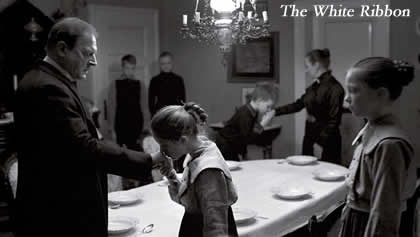 Alexandre Desplat’s brilliant unobtrusive score bridges Audiard’s stylistic jumps. Stephane Fontaine’s vivid handheld camerawork, Juliette Welfling’s surgical editing, and a stark grey production design by Michel Barthelemy add texture to the riveting novelistic 155-minute story.
Alexandre Desplat’s brilliant unobtrusive score bridges Audiard’s stylistic jumps. Stephane Fontaine’s vivid handheld camerawork, Juliette Welfling’s surgical editing, and a stark grey production design by Michel Barthelemy add texture to the riveting novelistic 155-minute story.
Germany‘s entry Michael Haneke’s “The White Ribbon” won the Palme d’or at Cannes. This faux “whodunit” is not my favorite Haneke. Taking a page from Alice Miller’s analysis of toxic, repressive German pedagogy, Haneke explores the possible roots of fascism in his grim ” German Children’s Story“, beautifully shot in black & white by Christian Berger (“Cache”, “The Pianist“). Inflected by early Bergman, Berger’s images on drained color stock won the ASC, NSCF, NYFCC and LAFCA awards.
It’s as if Kathe Kolwitz had illustrated “Children Of The Damned.”
Haneke’s precise, leisurely black and white images grant a Brechtian distance to this dark fable set in the Protestant village of Eichwald. Everyone owes fealty to the landowner, the Baron (Ulrich Tukur), his aggrieved wife (Ursina Lardi), and the rigid pastor (Burghart Klaussner). It’s a way of life, which will abruptly end with the assassination of Archduke Ferdinand of Austria in Sarajevo.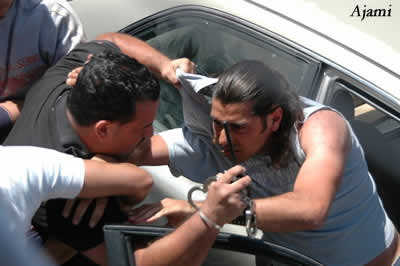
The only moments of warmth are the fumbling courtship of shy, young Eva (Leonie Benesch) and her older suitor, the schoolteacher (Christian Friedel).
The white ribbon (which summons ideas of feudalism) is given to young women as a symbol of purity. In this town, it’s awarded to children who’ve strayed but are trying to improve. They have no role models.
Deadening patriarchy, child abuse, torture and premature death are the norm. Even the children are vile, save for the pastor’s long-suffering young son who offers his own pet bird as a replacement of his father’s slain canary. The deadened eyes of the children (heir to their fathers’ sins) reflect the coming half-century of ruthless war.
Israel‘s entry “Ajami” (co-directed by two young directors, Israeli-Jew Yaron Shani and Israeli-Arab Scandar Copti) is set in the eponymous Jewish-Arab-Christian neighborhood in Jaffa. It’s another in a long series of International films using gangster tropes to uncover social injustice (with a de rigueur tragic ending.)
With the exception of Stephen Gaghan’s intelligent, content rich “Syriana“,
I’m largely resistant to interwoven films. “Ajami” interweaves five chapters. The choice to play them out of sequence complicates the story unnecessarily. Boaz Yehonatan Yacov’s dark hand-held camera work doesn’t help clarify a story that confused many in my screening audience.
In a fast paced opening, a young boy is gunned down in front of his house by mistake, setting off a bloody clan feud. Young Malek works illegally to pay for his mother’s operation. A wealthy Palestinian wants to marry his Jewish sweetie and is taunted by his friends. A Christian restaurateur blocks his daughter’s marriage to an Arab. A Jewish cop searches for his missing soldier brother.
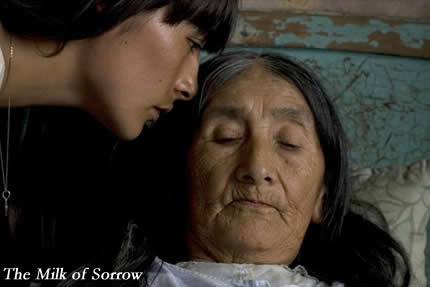 Non-pros workshopped for 10 months and improvised swathes of the action. As some scenes were shot in the street, confused neighbors jumped into the action, not realizing it was a film shoot. In my favorite scene a Jew from Jaffa tries to get his lounging Arab neighbors to remove their sheep, they’re keeping him up, he can’t get a good night’s sleep. Another strong scene is the expensive life and death deal brokered by an Imam to end the inter-clan feud.
Non-pros workshopped for 10 months and improvised swathes of the action. As some scenes were shot in the street, confused neighbors jumped into the action, not realizing it was a film shoot. In my favorite scene a Jew from Jaffa tries to get his lounging Arab neighbors to remove their sheep, they’re keeping him up, he can’t get a good night’s sleep. Another strong scene is the expensive life and death deal brokered by an Imam to end the inter-clan feud.
Peru‘s entry Claudiia Llosa’s “The Milk of Sorrow“, won Berlin’s “Golden Bear.”
In a riveting opening sequence, dying Perpetua stares into the camera, singing a list of atrocities she and her family suffered at the hands of Peru’s “Shining Path”, when she was raped and forced to swallow her tortured husband’s castrated penis. Perpetua’s legacy of fear is passed on to daughter Fausta (Magaly Solier), one of the offspring suckled on “the illness of the milk of sorrow”. To pay for her mother’s funeral, Fausta works for a rich patrona in Lima. She wears a potato in her vagina as a safeguard from rape. It takes root and sickens her, as a clinic docter discovers. Fausta befriends the gentle gardener Noé (Efraín Solis). Fausta’s manipulative employer pianist, Aida (Susi Sanchez) trades pearls for Fausta’s songs, as she begins to find a voice. Natasha Braier’s controlled compositions add grace to this allegorical piece. Llosa treats her inflammatory material with great restraint, using folk magic and Andean superstition to uncover the deep roots and horror of neocolonialism.

